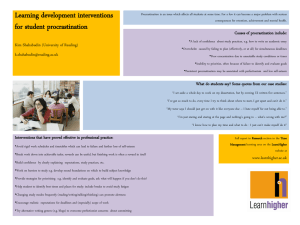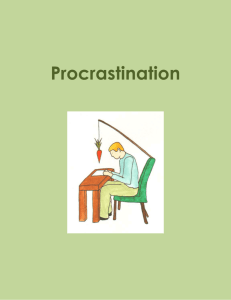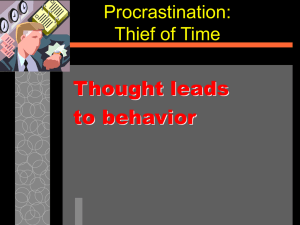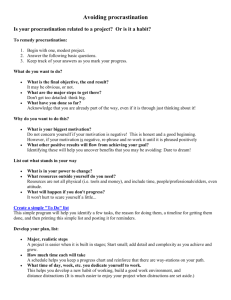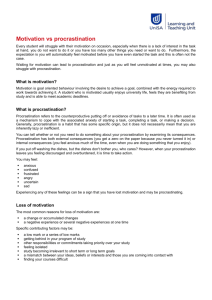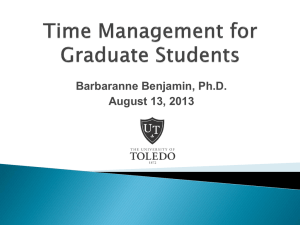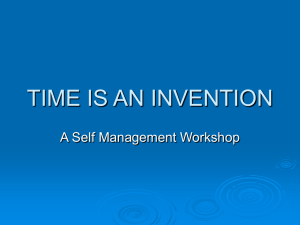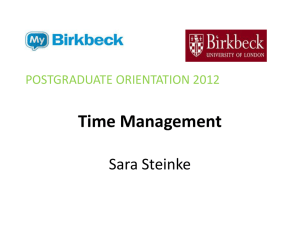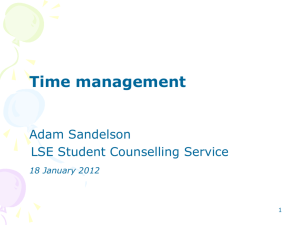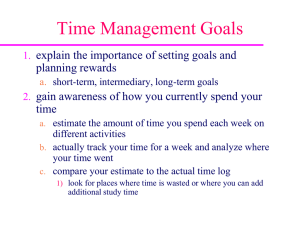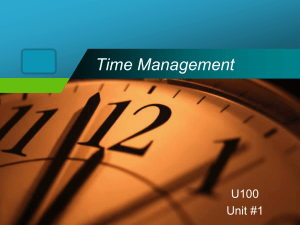Time Management for PhD Students
advertisement
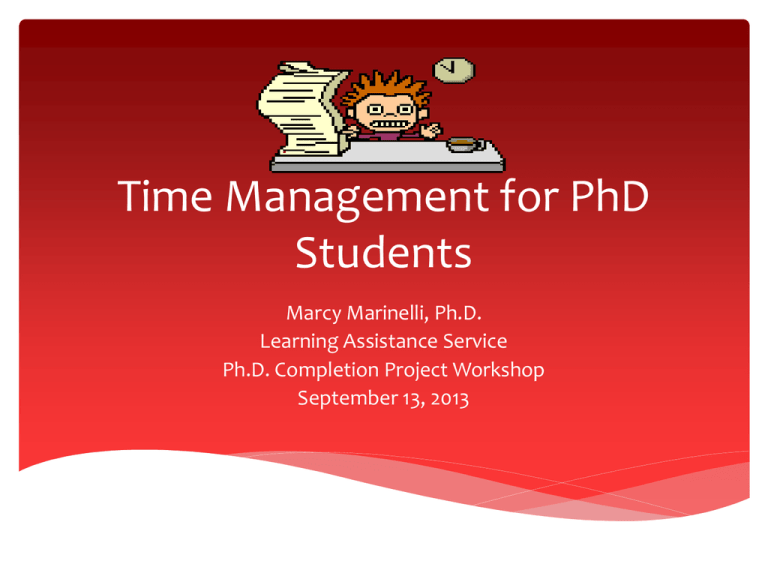
Time Management for PhD Students Marcy Marinelli, Ph.D. Learning Assistance Service Ph.D. Completion Project Workshop September 13, 2013 Objectives Identify roadblocks on the journey to PhD completion Learn why goals are important to your success Learn how to set goals and sub-goals Learn strategies to break tasks into manageable pieces Learn strategies to manage time and avoid procrastination and self-sabotage Identify ways to get back on track Does this sound familiar?? Internal Roadblocks Transition from student to scholar – am I good enough? Impostor Syndrome Ambiguity of the task Lack of structure – independent research Loneliness Exhaustion Motivation Procrastination/Poor Time Management Irrational Beliefs/Expectations/Self-Talk Perfectionism External Roadblocks Work Juggling multiple responsibilities Expectations of family and friends Advisor/Committee Issues Environmental Distracters Financial Issues Start with a Goal “Write my dissertation” is not a good goal SMART Goals Specific Measurable Attainable Realistic Testable Why Goals? Goals provide a road map Goals provide a deadline Goals provide motivation Goals maintain motivation Once one goal has been achieved, need to set another Written goals that you commit to are more likely to be achieved Writing a SMART goal Think about a dissertation task you would like to accomplish and write a SMART goal. Example: Read articles for my literature review and write up. SMART goal: To prepare for my literature review I will identify and read 30 articles on attachment theory and write that section of the lit review by November 1, 2013. Divide goals into sub-goals I will identify and read 30 articles on attachment theory and write this section of the lit review by November 1, 2013. September 15- 20– Do search on Library website for articles; identify 30 articles most relevant to my topic; read abstracts; decide which articles are most useful September 20-30 – Read and take notes on 3 articles per day October 1-17 – Write rough draft of attachment theory section of literature review October 18-October 31 – Polish and finalize this section November 1 – Send to advisor! The Typical PhD’s Week Time Management Basics Prime Time Chunking Learn to say “NO!” For many of us the toughest thing is getting started! Procrastination Procrastination = the art of making something into more than it is, until it expands into more than it needs to be; learned habit that lies in avoidance through diversionary activities 2 stages Active - impulse to delay – triggered by negative mood, boredom, threat, discomfort, or other imagined negative condition; avoidance activities Passive - Reassure self that later is better; make excuses, false justifications Self-Sabotage Creating obstacles to your goals so that you have an excuse if you fail (Kearns, Gardiner & Marshall, 2008) Ego protective Overcommitting Busyness Perfectionism Procrastination Disorganization Lack of effort Choose performance debilitating conditions Avoiding Procrastination and Self-Sabotage Make a choice not to procrastinate, have a good plan and take the first step Make sure you have a realistic, measurable goal for each dissertation session Identify obstacles and patterns of behavior that get in the way of goal achievement Explore the costs of the patterns Take action Identify and challenge your beliefs Avoiding Procrastination and Self-Sabotage First things first question Five Minute Method Write by hand Turn off your wireless or use a blocking app Turn off your cell phone Get into the writing habit – time and place Getting Back on Track Don’t let a lapse become a collapse Learn from your mistakes Sometimes you have to take a break! Reconnect with your goals and vision Use affirmations to remind you that you can do this Seek support from friends and family. Questions to Ask Yourself What is the most right way for me to devote my time and energy today? What is the one thing I can learn from today that will help me tomorrow?
